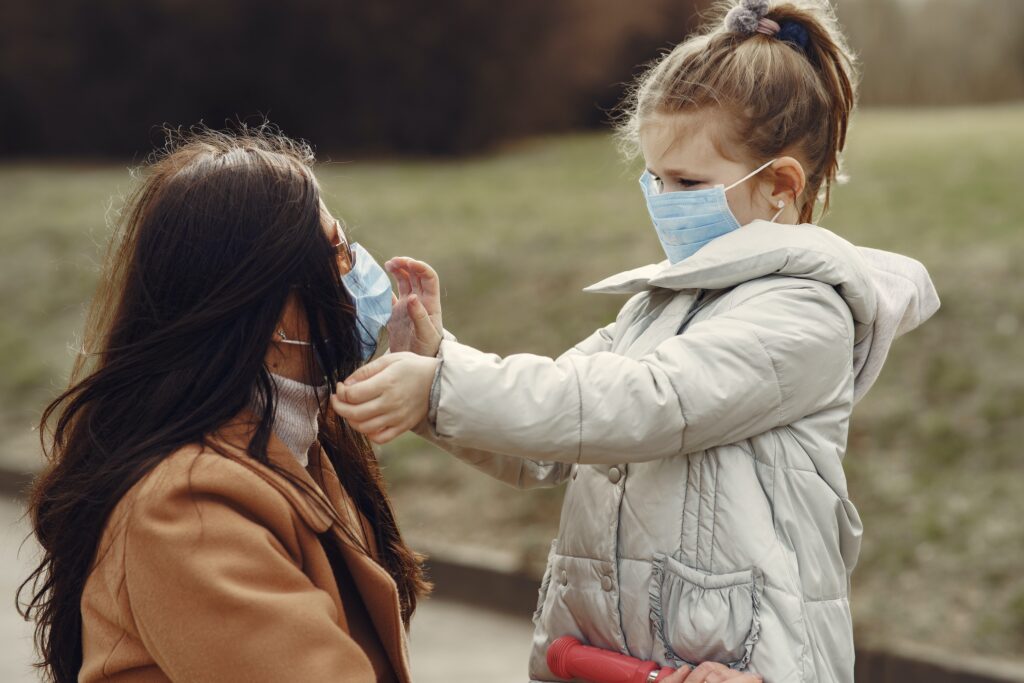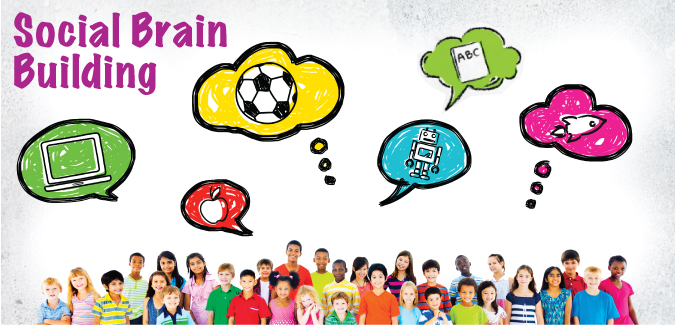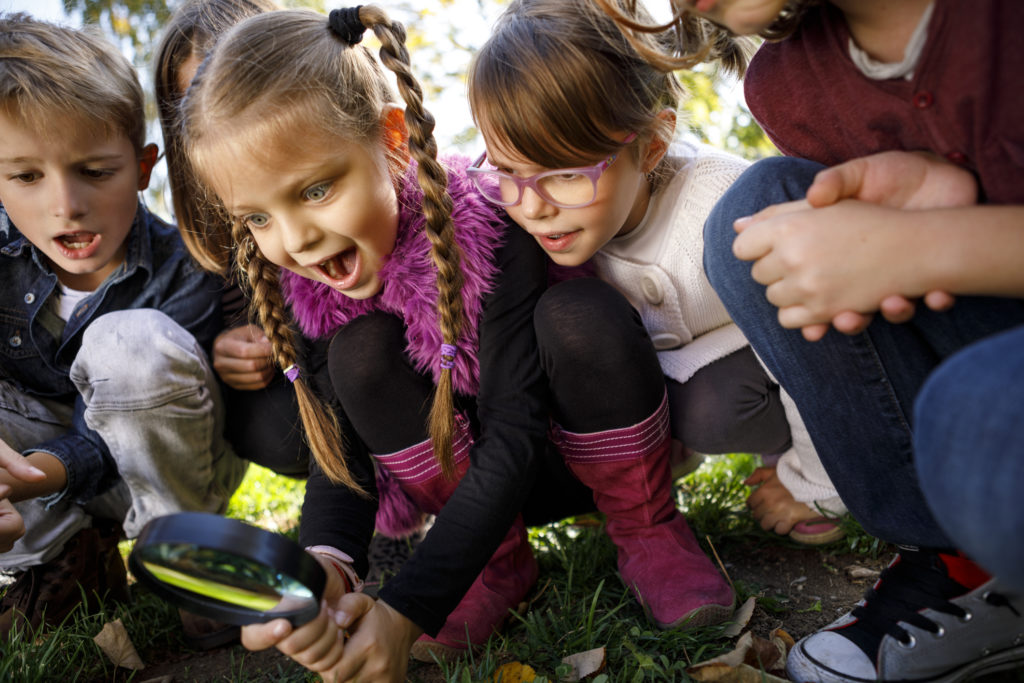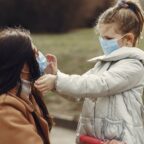social brain building
Helping a Child Learn About Non-Verbal Communication
Like all things topsy turvy in this strange new world we’re learning to live in, learning to learn, itself, has been turned upside down.
As occupational therapists working with children, we talk a lot about and address challenges common for children with sensory processing disorder – or the difficulty in dealing with sensory overload. Now, with parents, teachers, caregivers and peers all wearing masks, suddenly the problem is a lack of enough sensory input, in this case, visual input, making it difficult for young children developing early social skills, to understand feelings and expectations being communicated to them.
Our whole body is responsible for non-verbal communication, with verbal communication only accounting for 10%-30% overall. For young children or children with neuro-developmental differences, interacting with others in masks can be challenging – but our smile or frown, or anything in between, only accounts for a small amount of our non-verbal communications.
 Now is a good time to encourage and guide your child to become a “social detective”, looking for whole body language (non-verbal) cues that hold the clues to ideas, thoughts, feelings, attitude and state of mind being communicated, much of which is produced subconsciously. While eyes opened wide or brows furrowed are pretty obvious indicators of feelings, many children have difficulty with the intimacy of sustained eye contact. The “social detective” will need to pay closer attention to a person’s posture, movements, and arm placement (crossed or open, for example), for bigger and easier indicators to use when determining friendship and attention.
Now is a good time to encourage and guide your child to become a “social detective”, looking for whole body language (non-verbal) cues that hold the clues to ideas, thoughts, feelings, attitude and state of mind being communicated, much of which is produced subconsciously. While eyes opened wide or brows furrowed are pretty obvious indicators of feelings, many children have difficulty with the intimacy of sustained eye contact. The “social detective” will need to pay closer attention to a person’s posture, movements, and arm placement (crossed or open, for example), for bigger and easier indicators to use when determining friendship and attention.
To support a child’s critical early social development during this time of masks and social distancing, parents might try role playing with their children, pointing out different body postures and positions, and discussing what information those positions might be relaying. Practicing guessing how family members are feeling at home with and without masks can help with feelings of anxiety when venturing out of the house. Using favorite TV shows or YouTube characters can be helpful as well! Pause the show, cover up the character’s face on the screen and see if the posture of the character matches the emotion they are feeling. A few non-verbal check-ins a day will help grow your child’s awareness and understanding of non-verbal communication, and how to connect to those communications and the people sending them.
Preparing for Back to School with Social Emotional Brain Building
How the many aspects of social emotional brain building affect a child’s academic success.

When a parent thinks about “back to school”, thoughts probably turn to new backpacks, notebooks and sneakers. Academic questions likely come to mind too. After all, isn’t that mainly what school is all about? Well, yes, mainly. But a child’s back to school tool box needs to have social emotional skills too, as the ability to perceive, adapt, attend and self-regulate is key to effective learning and social integration. And let’s not forget about executive function, mindfulness and self-awareness. Let’s take a closer look at each of these to make sure you can check them off your child’s back-to-school “to do” list.
Social Brain Building
Much can and should be said about social brain building, and we’ve written much on the topic. But for the sake of this article, we’ll keep it short. In a nutshell, social brain building is the development of a child’s social emotional health, critical for interactions with others.
This developmental process is not always inherent, and relies upon efficient self-regulation, sensory motor processing, executive function, two-way communication, (verbal and non-verbal), and the capacity to stay connected, in order to develop problem solving skills and a sense of “self” in relationships. The integration of all these processing systems enables a child to think of others, taking into consideration their thoughts, emotions and intentions, and react in an expected manner to build attachments rooted in joyful, trusting relationships.
Communication
We navigate our world and our social relationships through language. Effective use of oral communication with peers sets the stage for positive self-esteem, and enables a child to advocate on his own behalf.
Receiving and processing non-verbal social communication cues requires a child to “think with their eyes”. By visually assessing a given situation they can determine what others might be thinking, how others are feeling, and what might be expected of them upon entering that situation or environment.
Speech Development Checklist
Executive Function
The ability to think as a “we” and follow directions, listen, attend, modify behavior and anticipate change, is the foundation of executive functioning. Executive function is a set of processes, or neurologically-based skills, that all have to do with managing oneself (mental control and self-regulation) and one’s resources in order to achieve a goal. A solid foundation of executive function skills is imperative to all learning.
Mindfulness and Self-Awareness
We hear a lot about “mindfulness” these days, but perhaps you’ve never heard of the body’s 8th sense. Interoception is a sensory system that gives us whole body awareness from the inside out. Receptors for interoception are widely spread throughout the body’s organs and give us a huge variety of sensations including but not limited to hunger, physical exertion, nausea, and the need to go to the bathroom. Interoception is deeply connected to our emotions and self-regulation. When a person is aware of their internal state they will either consciously or unconsciously take steps to self-soothe. That entire process from sensory perception, to awareness to self-soothing, all together is called self-regulation. Our desire is for our children to be regulated in order for them to successfully build meaningful relationships with others.
Self-regulation
Self-regulation refers to the ability to manage your reactions to your emotional and physical feelings and the environment around you, and begins with the ability to identify and validate those feelings. The ability to self-regulate is closely tied to one’s awareness of their internal state via the interoceptive sensory system as well as efficient management of input from all 8 sensory systems.
Sensory Processing
Self-regulation depends largely on a child’s capacity to turn the volume up and down on incoming sensory information from all 8 sensory systems. Effective sensory processing directly affects a child’s ability to attain and maintain the “just right” state of regulation necessary for the classroom and peer interactions.
So as you might have surmised, the system of social emotional skills is complex and highly interconnected. It is also vitally important to a child’s academic success, and really to all of life’s successes.
Have a look at these areas of development as part of your preparation for the upcoming school year. If you have concerns regarding your child’s proficiency in any of the areas discussed above, a consultation with an early childhood development specialist might be recommended. It’s never too late to learn a new skill set, but like with anything, the sooner the better!
Summertime Tips for Early Childhood Development
Summertime can provide endless opportunity to enrich early childhood development.
Summertime for young children means splashing in water, squishing sand between toes and endless hours of creative play. Still, there are ways for parents to guide a child’s play, here and there, to make sure they’re getting all the developmental support and enrichment they need to be ready for their next level of learning.
Summer tips for early childhood development – 2-6 year olds
The therapists at Child Success Center share some simple ways parents can foster early childhood development during the summer break.
Literacy:
- Sit and read with your child everyday. Choose books with illustrations and have your child talk about the story and images as you read it. When you’ve finished reading the book, ask your child to tell you what happened in the book in the beginning, middle and end. Books with little or no text encourage a child’s imagination to create the story.
- Consistency and accessibility can foster early literacy. At home, create a reading corner where you and your child can sit and enjoy books whenever you want. When traveling over the summer, take some favorite books along in the car or plane, and find some new ones that might be relevant to the places your visiting or the activities you’ll be experiencing.

Social Brain Building:
- Facilitate social skills building by challenging your child to get acquainted with one new peer each week during the summer break. Ask them to find out another child’s name and 2 fun facts about that child, such as what grade they’re going into and if they have a pet. This exercise helps a child build confidence when placed in new social groups or when entering a new classroom environment.
- Invite some of your child’s friends over to collaborate on building a fort or obstacle course. When completed, have them explain why they made the choices they did, and ask for a walk thru or demonstration.
- Limit screen time each day. With the extra “down time” during the summer break, it’s easy for a child to spend too much time in front of a screen. Limit screen time, making sure there’s plenty of time spent playing, exploring and socializing.
Communication:
- Encourage your child to share thoughts and words. One way to help build “communication temptation” is by keeping toys out of your child’s reach. This requires your child to use their language to ask you for what they want. As a child learns to request, provide two options, asking, “Do you want _____ or _____ toy? By doing this, the child is empowered with ownership over their choices.
- Language is everywhere! Increase your child’s exposure to language input by narrating, commenting, and labeling everything you see while playing, eating, and driving.
- Engage in activities that involve and stimulate the talking muscles, tongue, lips and jaw: Blowing bubbles, blowing kisses, drinking with a straw.
- Take pictures of your child’s day and talk about what happened first, next and last. Make a photo album of your child’s summer activities that he can talk about with friends and family.
Communication and social brain building skills come with shared play experiences, including just getting messy! Play with water, take out the finger paint, dig in the garden, build sandcastles. Have a great summer!
Social Learning Prepares Children for First and Second Grade
Your kindergartner or first grader works hard at school. Not only are there academic expectations, but your child needs to self-regulate in order to manage the various social expectations. Whether following planned group activities, transitioning from one activity to another, using spoken language to share ideas, taking turns, listening when others speak, or managing big feelings and big energy, social brain building is imperative for success.
Your child wants to belong, feel connected, solve problems, share ideas and work within a group, but it doesn’t always happen naturally. Often a child needs the “just-right” support for their individual make up, to be able to build the foundational skills of self-regulation and flexible thinking, then be able to put them into practice within a group environment.
Children who struggle with self-regulation and flexible thinking in kindergarten or first grade often enter the next grade level with anxiety or struggles with:
- Making transitions
- Managing big feelings and energy levels
- Talking out of turn or grabbing
- Negotiating and compromising
- “Plugging in” to group plans and processes
Could your child use a boost in their Social Brain Building this summer?

Child Success Center’s social learning specialist, Patty Ramsey, LMFT, has designed a 2-week summer enrichment camp that will help campers gain the social skills and confidence they need for successful relationships in first or second grade.
With a plan designed and implemented by CSC’s skilled and compassionate occupational therapists and speech and language pathologists, this summertime fun adventure will allow children to make use of their boundless imaginations and the power of play. As a team, they’ll “create” their “campsite” and problem solve camp themed scenarios, like what they would need to pack for a camping adventure, how they’d get there, what they would do once they got there, what they would take to eat and what they would see.
Campers will use their imagination to guide them on their journey –
destination unknown – of fun, adventure and team building!
Are there resources available for parent support of social brain building at home?
Social Brain Building Summer Camp will provide visuals, activities, and education on key ways for parents to help support a child’s ongoing social learning. Additionally, one parent education session, presented by Patty Ramsey, will be available for more in-depth supports.
Learn more about Social Brain Building Summer Camp
Year round Social Brain Building and Friendship Club at CSC
post updated January 28, 2020



